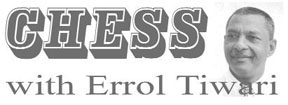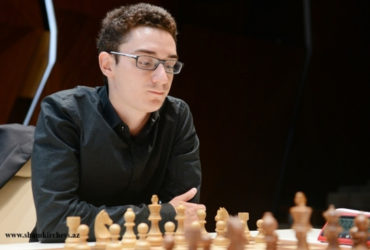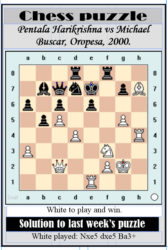Last Sunday morning, the illegal Guyana Chess Federation (GCF) strolled without purpose in its usual manner, into the meeting room of the National Resource Centre. A ridiculously small gathering met there to contest a one day 15-minute-per-player chess competition, referring to it comically as the Independence Chess Tournament. The notification for the tournament arrived the previous Friday evening, leaving players limited time to psychologically  prepare, and to seriously consider competing in the suggested competition. What was the rush? Was it to create an organized show for the beginning of September, the month of the Chess Olympiad? In this column’s opinion, convening the tournament at such short and trivial notice, falls within the swirl of distractions which is occupying the mind of the GCF currently.
prepare, and to seriously consider competing in the suggested competition. What was the rush? Was it to create an organized show for the beginning of September, the month of the Chess Olympiad? In this column’s opinion, convening the tournament at such short and trivial notice, falls within the swirl of distractions which is occupying the mind of the GCF currently.
With the federation mired in an ongoing embarrassing standoff with some of its more reliable members, one may be wont to agree that instead of a one day tournament, the constituted body could have named a date for an Annual General Meeting in accordance with the constitution of the GCF. The tournament could have waited, thereby giving it more time to work properly. At the AGM, the election of office bearers takes place. It is shameful therefore, that no annual general meeting has been held since the present committee assumed office in February 2014. There is no accountability for local funds and funds remitted to the GCF by the parent body of international chess, FIDE. One is left to suppose there is no intention of naming a date at this time. More than likely, I suspect there may be a sinister plot attached to creating a few squeaky tournaments before September. Such action may be commendable if all was well within the walls of the Federation. But this is not so. The priority of the day, I wish to emphasize, lies in naming a date for the AGM.

For hundreds of years, chess has been a game demanding a kaleidoscope of skills: memory and creativity, deft psychology, and I would like to believe, a special set of calculating skills. As you graduate higher in chess, you naturally fine-tune those set of skills. A promising chess player calculates with accuracy. It’s the only way to survive and make hay in the complex world of international chess. The higher you go, the more accurate you become. This feature transposes itself into everyday living. Without noticing it, you adopt some natural beneficial traits. The place to search, find and eventually nurture memory, creativity, among other skills, would be in our schools. Disappointingly enough, we have not had an inter-schools competition for a few years. Instead, we are concentrating principally on the Olympiad. How can chess develop? Is the game for a selected few? A former president of the GCF Forbes Burnham had said, ‘chess is for everyone’. I suppose the texture of that statement is gradually, and rudely, being faded. However, interestingly enough, some hope still abounds with Frankie Farley, who is running for the presidency of the GCF. Farley has vowed to launch chess into the limelight of the schools, in a limited manner, and develop the game additionally, and methodically, from there.
In international chess, the great Gashimov Memorial Tournament comes to an end today in Shamkir, Azerbaijan. The leader of the ten world class competitors is US grandmaster Fabiano Caruana with the Netherlands’ Anish Giri in second place. Both players have been unbeaten so far. Russian grandmaster Sergey Karjakin, who plays for the world championship title in November, is in the third position. He lost to Giri.
Chess games
The following games were played at the third annual Shamkir Chess super-tournament, dedicated to the memory of Vugar Gashimov, in Azerbaijan. The tournament ends today.
White: Fabiano Caruana
Black: Pentala Harikrishna
- e4 c5 2. Nf3 e6 3. d4 cxd4 4. Nxd4 Nc6 5. Nc3 Qc7 6. Be3 a6 7. Qf3 Nf6 8. O-O-O Nxd4 9. Bxd4 e5 10. Be3 d6 11. h3 b5 12. Bd3 b4 13. Nd5 Nxd5 14. exd5 a5 15. Kb1 Be7 16. g4 O-O 17. g5 Ba6 18. Qe4 g6 19. h4 Rfc8 20. Rc1 Qd7 21. Bxa6 Rxa6 22. f4 Qf5 23. Qxf5 gxf5 24. c3 bxc3 25. Rxc3 Rxc3 26. bxc3 Ra8 27. Kc2 Rb8 28. Rf1 e4 29. a4 Kf8 30. h5 Ke8 31. Rg1 Kd7
- Bd4 Kc7 33. g6 fxg6 34. hxg6 hxg6 35. Rxg6 Rf8 36. Rg7 Kd7 37. c4 Ke8 38. Kc3 Bh4 39. Ra7 Be1+ 40. Kc2 Rg8 41. Ra8+ Kf7 42. Ra7+ Ke8 43. Ra8+ 1/2-1/2.
White: Anish Giri
Black: Sergey Karjakin
 g3 c5 2. Bg2 Nc6 3. c4 g6 4. Nc3 Bg7 5. a3 d6 6. Rb1 a5 7. d3 e5 8. e4 h5 9. h4 Bh6 10. Bh3 Bxc1 11. Rxc1 Nf6 12. Bxc8 Rxc8 13. Nge2 O-O 14. O-O Qd7 15. Kg2 Kg7 16. f3 Nd4 17. Rf2 b6 18. a4 Rb8 19. b3 Rb7 20. Rb1 Rbb8 21. Qd2 Rbe8 22. Qb2 Qb7 23. Rbf1 Ng8 24. Nd5 Ne7 25. Nxd4 exd4 26. Nf4 Qd7 27. Re2 Nc6 28. Qd2 Nb4 29. Rfe1 Re5 30. Nh3 Re7 31. f4 f6 32. Qd1 Rh8 33. Kh2 Qg4 34. Kg2 Rhe8 35. f5 gxf5 36. Nf2 Qg6 37. exf5 Rxe2 38. fxg6 Rxe1 39. Qxh5 Rh8 40. Qf3 Re3 41. Qg4 Re5 42. Qd7+ Kxg6 43. Ne4 Nxd3 44. Qg4+ Kh6 45. Nxd6 Rf8 46. Nf5+ Rxf5 47. Qxf5 Ne5 48. Qe6 d3 49. Qxb6 Rf7 50. Qxa5 Rd7 51. Qd2+ Kg7 52. a5 Nc6 53. a6 Kf7 54. h5 Nb4 55. h6 Kg6 56. Qf4 Rd4 57. h7 Rxf4 58. h8=Q d2 59. Qe8+ Kh6 60. Qh8+ Kg6 61. Qe8+ Kh6 62. Qe2 Rd4 63. a7 d1=Q 64. Qxd1 Rxd1 65. a8=Q Rd2+ 66. Kf3
g3 c5 2. Bg2 Nc6 3. c4 g6 4. Nc3 Bg7 5. a3 d6 6. Rb1 a5 7. d3 e5 8. e4 h5 9. h4 Bh6 10. Bh3 Bxc1 11. Rxc1 Nf6 12. Bxc8 Rxc8 13. Nge2 O-O 14. O-O Qd7 15. Kg2 Kg7 16. f3 Nd4 17. Rf2 b6 18. a4 Rb8 19. b3 Rb7 20. Rb1 Rbb8 21. Qd2 Rbe8 22. Qb2 Qb7 23. Rbf1 Ng8 24. Nd5 Ne7 25. Nxd4 exd4 26. Nf4 Qd7 27. Re2 Nc6 28. Qd2 Nb4 29. Rfe1 Re5 30. Nh3 Re7 31. f4 f6 32. Qd1 Rh8 33. Kh2 Qg4 34. Kg2 Rhe8 35. f5 gxf5 36. Nf2 Qg6 37. exf5 Rxe2 38. fxg6 Rxe1 39. Qxh5 Rh8 40. Qf3 Re3 41. Qg4 Re5 42. Qd7+ Kxg6 43. Ne4 Nxd3 44. Qg4+ Kh6 45. Nxd6 Rf8 46. Nf5+ Rxf5 47. Qxf5 Ne5 48. Qe6 d3 49. Qxb6 Rf7 50. Qxa5 Rd7 51. Qd2+ Kg7 52. a5 Nc6 53. a6 Kf7 54. h5 Nb4 55. h6 Kg6 56. Qf4 Rd4 57. h7 Rxf4 58. h8=Q d2 59. Qe8+ Kh6 60. Qh8+ Kg6 61. Qe8+ Kh6 62. Qe2 Rd4 63. a7 d1=Q 64. Qxd1 Rxd1 65. a8=Q Rd2+ 66. Kf3
Rd3+ 67. Kf4 Rxb3 68. Ke4 1-0.
White: Pentala Harikrishna
Black: Pavel Eljanov
- e4 e5 2. Nf3 Nc6 3. Nc3 Nf6 4. Bb5 Bb4 5. O-O O-O 6. d3 Bxc3 7. bxc3 d6 8. Nd2 Bd7 9. f4 exf4 10. Rxf4 Ne7 11. Bxd7 Nxd7 12. c4 Ne5 13. Bb2 f6 14. Nf1 Qd7 15. Ne3 a6 16. Qh5 b5 17. Rh4 h6 18. Rf1 bxc4 19. d4 Nf7 20. Ng4 Qb5 21. Nxf6+ gxf6 22. e5 Kh8 23. Bc1 Ng8 24. Qg6 dxe5 25. Rxf6 Qb1 26. Rf1 exd4 27. Bxh6 Qxf1+ 28. Kxf1 Nfxh6+ 29. Kg1 Rab8 30. Rxh6+ Nxh6 31. Qxh6+ Kg8 32. Qg6+ Kh8 33. h3 d3 34. Qh6+ Kg8 35. Qxa6 dxc2 36. Qxc4+ Kh8 37. Qc3+ Kg8 38. Qxc2 Rfc8 39. Qc6 Kf7
- a4 Ke7 41. a5 1-0.
White: Rauf Mamedov
Black: Teimour Radjabov
- e4 c6 2. d4 d5 3. Nd2 dxe4 4. Nxe4 Bf5 5. Ng3 Bg6 6. Nf3 Nd7 7. Bd3 Bxd3 8. Qxd3 e6 9. O-O Ngf6 10. Bf4 Be7 11. c4 O-O 12. Rfd1 Qb6 13. Qc2 Rfe8 14. Ne5 Rad8 15. h3 Nf8 16. Rd3 c5 17. Rb3 Qa6 18. Ra3 Qb6 19. Rb3 Qa6 20. Ra3 Qb6 1/2-1/2.




